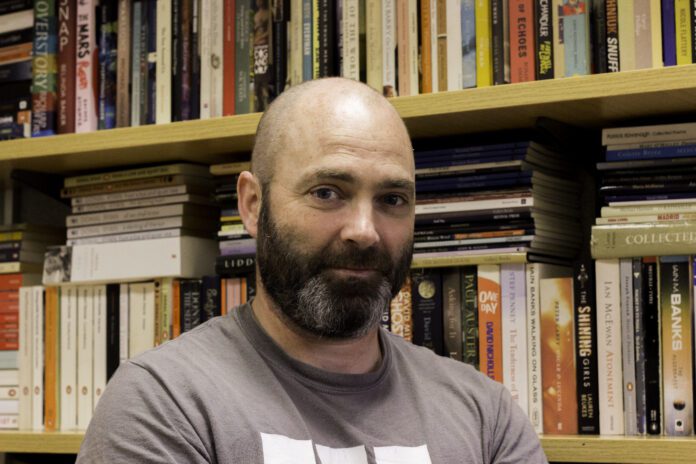
by Manon Gilbart
WHEN award-winning novelist Donal Ryan looks out the window of his office in the Schuman Building at the University of Limerick, he often gives words to the people he sees outside.
And with five novels and a collection of short stories to his credit, he has plenty of words to give to those walking by.
“Sometimes an hour can go past while I’m looking through the window. People stop and you can see them having animated conversations and I find myself giving words to each person,” he explains.
The Nenagh native recently became the first Irish writer to win the Jean Monnet literary award for European Literature for the translation of his 2018 novel ‘From a Low and Quiet Sea’.
There have been other accolades, including a couple of Man Booker Prize nominations, but the Monnet award is something of a milestone for Ryan. So, does he ever worry that some nuances might get lost in translation?
“Because a lot of the language in my books is kind of vernacular, I think it’s a huge challenge for translators”, he answers.
“I really enjoy the process of working out how best to translate a piece of writing. Sometimes I think the questions I’m asked would never have occurred to me, and sometimes things I take for granted aren’t universally understood.
“I was thinking that it’s mainly because I haven’t travelled very much – I don’t like to travel, so maybe these things that I think are universal are actually just typical to where I’m from in Tipperary.”
“Sometimes translators have hundreds of queries, which I expect, and sometimes there are none at all, which is even more worrying,” he says with a hint of humour.
He has held on to his rejection letters and doesn’t shy away from talking about his occasional bursts of bad temper.
“I get very sulky and upset, I have a bad temper. To be honest, I overreact sometimes but I’ve learned over the years to cope because rejection never ends as a writer. Rejection comes in many forms, and that’s totally fine. Everybody is free to dislike a book and not appreciate something, but I think what upsets me most is when someone sneers – I’ve got this terrible hatred for the act of sneering. Sneering is a horrible way of being reductive about somebody or something.
“I suppose it’s very often an expression of bitterness, and I should realise that, but if someone sneers at me in public, I tend to overreact.”
Reflecting on his attempts to get published as a first time novelist, he says he accepted rejection because he had no track record.
“When it feels as though you’re working into a void and nobody can hear what you’re saying, it can be upsetting. But, for the most part, I shouldn’t complain because most people are so supportive and kind and I’ve been so lucky when it comes to being published. I’ve had such incredible good fortune.”
Not only is Donal Ryan a prolific novelist, he is also a lecturer in Creative Writing at the University of Limerick. It’s a role he describes as the single most helpful thing that happened to him as a writer.
“It forces me to think more forensically, more assiduously about the act of writing. For example, making sure a piece of writing has a proper pace. It’s something that you do unconsciously, but when you start thinking and talking about it, it makes you more aware.
“Those elements of the act of writing, I’m now more careful about because I know how important they are – I know not to take them for granted.”
Mentioning the students on the course, he says; “There’s such talent. It’s amazing how talented people can be and how they can have no idea how talented they are. It can be so hard to explain to somebody that they’re a good writer, sometimes people have such a lack of confidence and I remember I was so like that myself. It’s great to be in a position where I can help somebody to get confidence.”
Does he feel a fiction writer should wear their heart on their sleeve?
With a nod, he replies: “I’ve met writers who think you have to be hard and cold, that you have to be armoured against the world in order to observe it – coldly and sharply.”
“When I wrote my second novel, I became completely immersed in the main character. It’s a very intense novel because everything is presented through the eyes of the character and you kind of have to live with him.”
“There are some fantastic storytellers who are completely detached, and they write amazing stories, but I think for a certain type of story you need to be involved, and you need to open yourself up. I think that’s why some people find it very hard – being vulnerable is exposing parts of your soul that you wouldn’t normally expose. It’s not like being a firefighter and running into a burning building. But you kind of put yourself at risk, psychologically.”
For an author, it can be hard to pick a favourite when it comes to their own work, it is like asking someone who their favourite child is.
But he has a favourite – book that is. It’s the French edition of his first novel, ‘The Spinning Heart’, which was published in 2012.
“I wrote it for one reason, and it was to impress my wife – and she’s really hard to impress. I kept saying that I wanted to write a novel. I’d start novels and wouldn’t finish them. She knew I saw myself as a writer.”
“I knew she was a bit disappointed in me that I hadn’t fulfilled this promise. I could sense her disappointment, it was kind of unarticulated but, I knew that she was somewhere deep inside thinking ‘Donal really has kind of let himself down by not being a writer’.
“So, I said, ‘I have to do it, I have to finish a novel so I can claim to be a writer. I can claim to have succeeded in something’. I never dreamed it would be published, I knew how hard it was to get published and because I really loved the character so much, it made me love the book. It made me think the book was really worth something. That’s a great thing because very often people create things and they can’t see their creation’s worth – it’s terribly sad when that happens.”
“When I actually had a book in my hand, it just felt so real. I didn’t feel as though I was worthy of it, to be honest. To see your book on a shelf in a shop is an incredible thing, it just existed as a thing outside of myself.”
“Sometimes I go into bookshops, and I rearrange the books on the charts number one to ten. My sister actually does it aggressively. Because my name is Ryan, it’s low in the alphabetical order so she gets really upset by this, thinking: ’At people’s feet? They can’t see his books’ so she puts them up at high level.”
The best advice he has ever received is, quite simply, to write.
“Keep writing. Write no matter what, even if it feels wrong, even if it’s not coming out right, and eventually you’ll hit that sweet spot and you’ll be able to keep going.
“I think it’s also very important to read a lot. You have to make sure your language remains usable, and warm. The only way to do that is to engage with language a lot, to read everything.”
Is there something he would never write about?
“Well, I tend to avoid sex to be honest because it’s just too embarrassing – my mother reads my books.”
On a more serious note, he adds: “But no, I think it’s important that nothing should be off limits to writers, I think we have an obligation to describe existence. It’s important that we’re open to all experiences and to all the facets of humanity, to the darkness that exists in the world. There are books that are written for joy, they’re often called cosy books or chick lit books, they get those kind of reductive terms but those books are very important because they bring people joy, and nothing that brings joy can be bad.”
“I think it’s important that I don’t tell myself; ‘No I can’t write about that, it’s none of my business’ What is my business? What experience? If you confine yourself to your own lived experience, for me at least it would lead to very boring books.”
What is his reaction to recent opinions about writers appropriating stories?
“There’s not much else we can do. I mean we have no choice; appropriation is almost a pejorative term now, almost like an accusation. ‘You stole that’ – But what else can you do? You have to look at the world and try to imagine what it might be like to be somebody else. Appropriation is part of the act of writing fiction.”
Speaking of what is often described as a new wave of Irish writers, he says: “The only way you can define Irish writing is writing that’s by an Irish person or a person writing in Ireland, about Ireland. We don’t get together and say ‘Ok guys this year we’re just going to write about a certain theme’, you know.
“I hate to see a whole nation of writers being dismissed, because we’re all so different, and everyone’s taste is different, everyone’s style is different. There’s such strikingly original work coming from Ireland at the moment.”
“I think there’s a lot of jealousy too. When someone like Sally Rooney has this mediatic rise that she totally deserves, because she’s such a good writer, people will want to bring her down out of pure jealousy. It’s the terrible truth about human condition, a part of all of us that enjoys criticising someone, if somebody has better views, people tend to sneer a bit.”
“There’s something unique about Irish writing. We tend to use a kind of fractured syntax and to invert our sentences a little bit. I think there’s a tendency for Irish people to overlay English and Irish, we retained syntax, but we use the English words because we had to, because there were times in our history where it was against the law to speak Irish, you could be killed for it.”
“We had to make it unique and we had to use language in a way that was completely opaque to foreigners, to the British, to the invaders. We needed to be able to communicate. It’s amazing how many dialects and how many languages there are in Ireland, a lot of Traveller languages – almost fully lost now – that are glorious.
“The idea that we have this way of using language as barrier to being oppressed, as a way of coming out of under repression, it’s what makes our approach to language unique. We’ve been an independent nation for nearly a hundred years but it’s kind of engraved on us, it’s how we developed.”
If he could wish for someone to read his book, it would be American best-selling author Stephen King.
“My sister sent my book to Steven King because she knew he is the writer I loved most growing up, the one who influenced me most to become a writer. Even though I was angry with her, and told her it was embarrassing, I was still hoping he’d read it.”
How would he describe his writing with only three words?
“I would say genuine, heartfelt, unforced. I feel like I’m saying these nice things about myself and I have no right to. I think all writers feel a weird embarrassment about their work.”
Next summer, his sixth novel is scheduled for publication.
“I accidentally told the name of the book on radio, and apparently I wasn’t supposed to, but it’s called ‘The Queen of Dirt Island’. It’s kind of a follow-up to ‘Strange Flowers’ about four generations of women of the same family living in the same house. I’m really happy with it actually. I suppose it’s kind of close to my heart seeing as I based the characters on the women in my life”.










